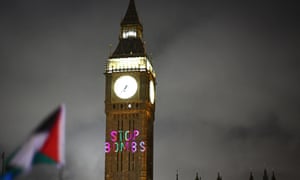How a ceasefire vote led to two days of chaos in the Commons
It could not have been a more serious subject – MPs were being asked by the SNP to vote in favour of a ceasefire in the conflict between Israel and Gaza. Yet despite the urgency of the issue, the session descended into arguments and fury, with SNP and Conservative politicians storming out.
The SNP had tabled a motion that included an accusation that Israel was using collective punishment against the Gazans. Critics say the motion was calculated to create divisions in Labour; between MPs who wanted to vote for a ceasefire and the party leadership who would not agree with the wording. Instead Labour tabled an amendment to the motion, explains Kiran Stacey, the Guardian’s political correspondent. But the Conservative party then issued its own amendment, on the understanding that convention dictated it would trump Labour’s amendment.
It could have been a difficult test of Starmer’s leadership. Instead Lindsay Hoyle, the speaker of the House of Commons, allowed both amendments to be heard, against usual parliamentary precedent. Conservative and SNP politicians were furious and left, allowing Labour’s amendment to pass, Hannah Moore hears. The day after, MPs sent in letters of no confidence to the speaker, calling for him to resign. Hoyle apologised and said he was worried about the safety of MPs who might be whipped not to vote for a ceasefire.
The Birmingham and Yardley MP Jess Phillips, who resigned from the shadow cabinet after voting for a previous ceasefire motion, explains how shocking this chaos looked. She explains the problems MPs are facing over the issue, and why she believes Hoyle acted with the best intentions. She says, however, that such a serious issue should not have been treated as a way to score political points.
